Essay: Analyzing the Bioethical Issue of Abortion in Society
VerifiedAdded on 2021/04/17
|7
|1696
|274
Essay
AI Summary
This essay delves into the complex bioethical issue of abortion, exploring it through the lenses of deontological and teleological approaches. The author examines two primary ethical frameworks: natural moral law and utilitarianism, to analyze the moral considerations surrounding abortion. The essay discusses the natural moral law's perspective, particularly within a Christian context, highlighting the conflicts arising from the principle of respecting life and the need for self-preservation. It also examines the Doctrine of Double Effect and the differing viewpoints of pro-life and pro-choice advocates. The essay further analyzes the utilitarian perspective, drawing on the views of Jeremy Bentham and John Stuart Mill, and contrasting them with Peter Singer's stance. It explores various positions within the abortion debate, including the legal and moral dimensions, and the role of government. The author concludes by reflecting on the moral implications of abortion and the importance of critical review in such cases, emphasizing the need for moral balance and the evolving social and medical norms that shape the discourse.
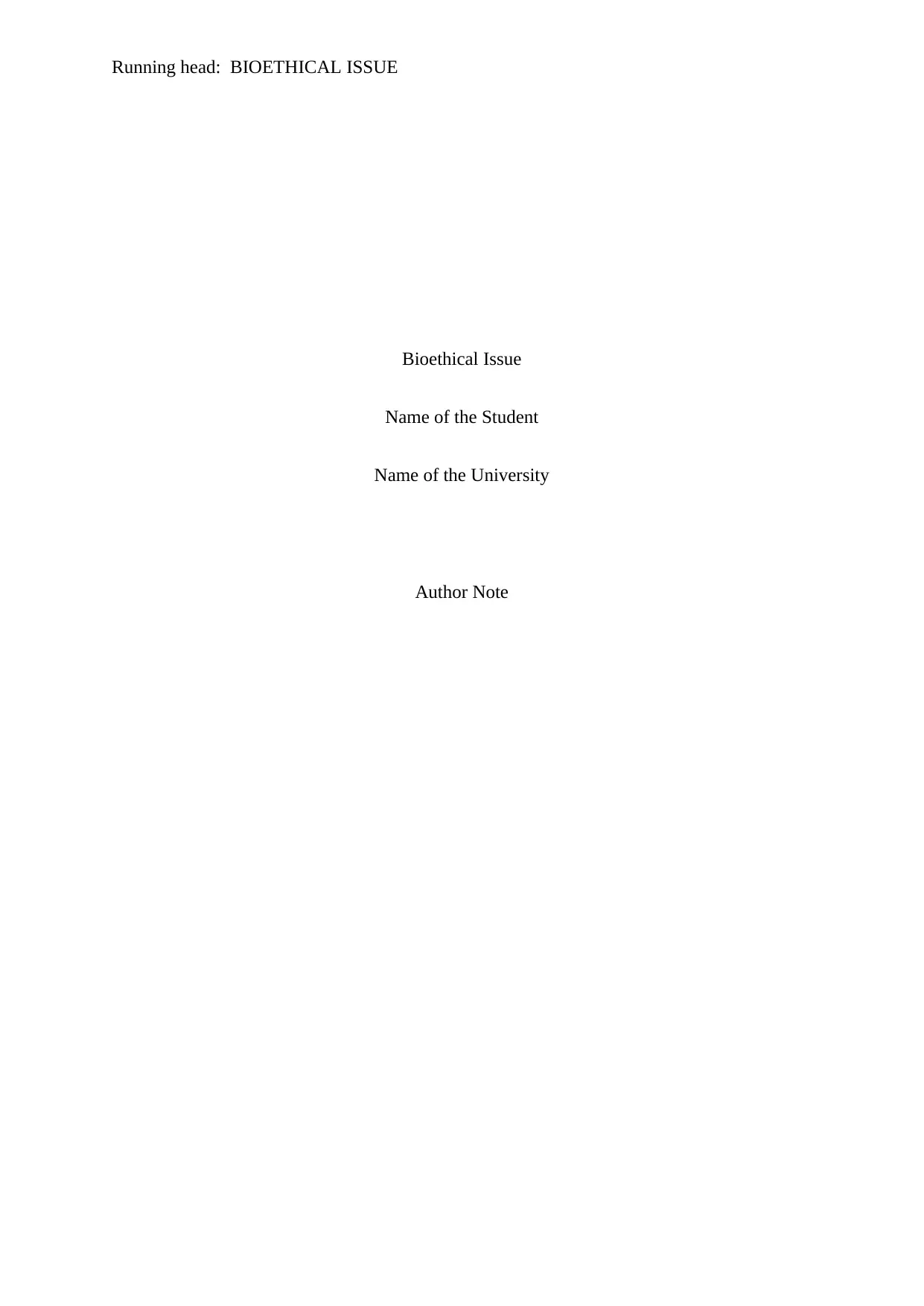
Running head: BIOETHICAL ISSUE
Bioethical Issue
Name of the Student
Name of the University
Author Note
Bioethical Issue
Name of the Student
Name of the University
Author Note
Paraphrase This Document
Need a fresh take? Get an instant paraphrase of this document with our AI Paraphraser
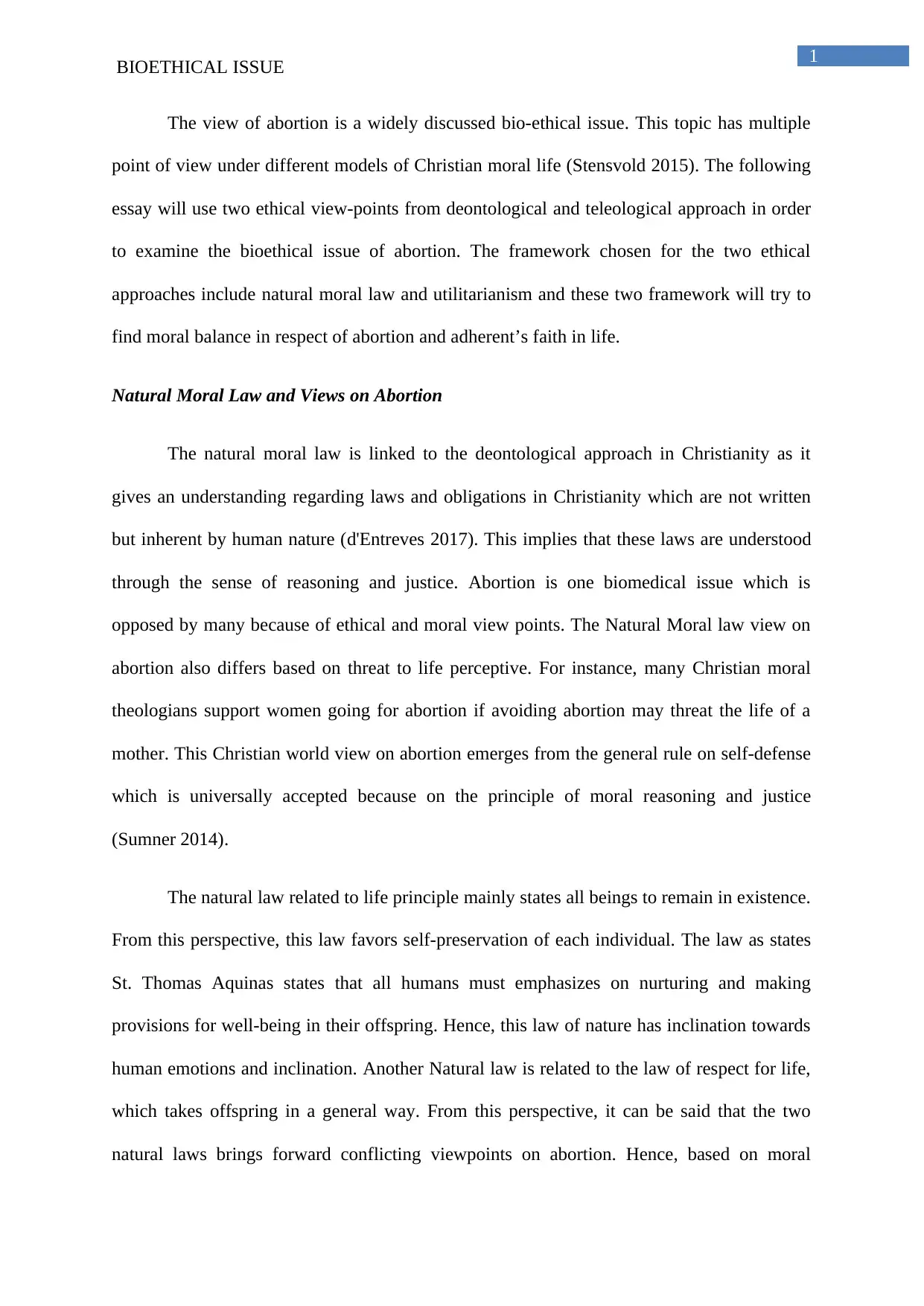
1
BIOETHICAL ISSUE
The view of abortion is a widely discussed bio-ethical issue. This topic has multiple
point of view under different models of Christian moral life (Stensvold 2015). The following
essay will use two ethical view-points from deontological and teleological approach in order
to examine the bioethical issue of abortion. The framework chosen for the two ethical
approaches include natural moral law and utilitarianism and these two framework will try to
find moral balance in respect of abortion and adherent’s faith in life.
Natural Moral Law and Views on Abortion
The natural moral law is linked to the deontological approach in Christianity as it
gives an understanding regarding laws and obligations in Christianity which are not written
but inherent by human nature (d'Entreves 2017). This implies that these laws are understood
through the sense of reasoning and justice. Abortion is one biomedical issue which is
opposed by many because of ethical and moral view points. The Natural Moral law view on
abortion also differs based on threat to life perceptive. For instance, many Christian moral
theologians support women going for abortion if avoiding abortion may threat the life of a
mother. This Christian world view on abortion emerges from the general rule on self-defense
which is universally accepted because on the principle of moral reasoning and justice
(Sumner 2014).
The natural law related to life principle mainly states all beings to remain in existence.
From this perspective, this law favors self-preservation of each individual. The law as states
St. Thomas Aquinas states that all humans must emphasizes on nurturing and making
provisions for well-being in their offspring. Hence, this law of nature has inclination towards
human emotions and inclination. Another Natural law is related to the law of respect for life,
which takes offspring in a general way. From this perspective, it can be said that the two
natural laws brings forward conflicting viewpoints on abortion. Hence, based on moral
BIOETHICAL ISSUE
The view of abortion is a widely discussed bio-ethical issue. This topic has multiple
point of view under different models of Christian moral life (Stensvold 2015). The following
essay will use two ethical view-points from deontological and teleological approach in order
to examine the bioethical issue of abortion. The framework chosen for the two ethical
approaches include natural moral law and utilitarianism and these two framework will try to
find moral balance in respect of abortion and adherent’s faith in life.
Natural Moral Law and Views on Abortion
The natural moral law is linked to the deontological approach in Christianity as it
gives an understanding regarding laws and obligations in Christianity which are not written
but inherent by human nature (d'Entreves 2017). This implies that these laws are understood
through the sense of reasoning and justice. Abortion is one biomedical issue which is
opposed by many because of ethical and moral view points. The Natural Moral law view on
abortion also differs based on threat to life perceptive. For instance, many Christian moral
theologians support women going for abortion if avoiding abortion may threat the life of a
mother. This Christian world view on abortion emerges from the general rule on self-defense
which is universally accepted because on the principle of moral reasoning and justice
(Sumner 2014).
The natural law related to life principle mainly states all beings to remain in existence.
From this perspective, this law favors self-preservation of each individual. The law as states
St. Thomas Aquinas states that all humans must emphasizes on nurturing and making
provisions for well-being in their offspring. Hence, this law of nature has inclination towards
human emotions and inclination. Another Natural law is related to the law of respect for life,
which takes offspring in a general way. From this perspective, it can be said that the two
natural laws brings forward conflicting viewpoints on abortion. Hence, based on moral
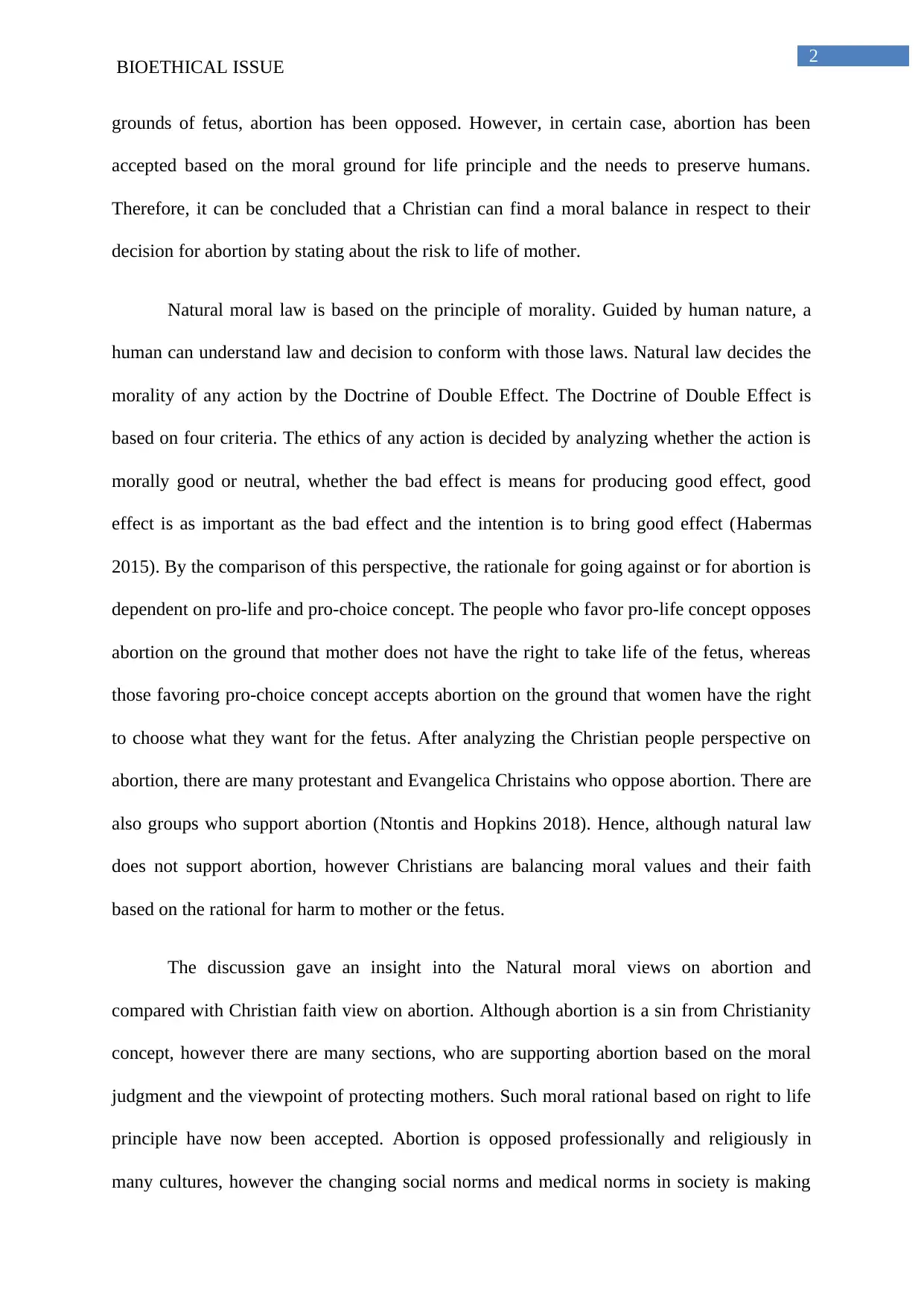
2
BIOETHICAL ISSUE
grounds of fetus, abortion has been opposed. However, in certain case, abortion has been
accepted based on the moral ground for life principle and the needs to preserve humans.
Therefore, it can be concluded that a Christian can find a moral balance in respect to their
decision for abortion by stating about the risk to life of mother.
Natural moral law is based on the principle of morality. Guided by human nature, a
human can understand law and decision to conform with those laws. Natural law decides the
morality of any action by the Doctrine of Double Effect. The Doctrine of Double Effect is
based on four criteria. The ethics of any action is decided by analyzing whether the action is
morally good or neutral, whether the bad effect is means for producing good effect, good
effect is as important as the bad effect and the intention is to bring good effect (Habermas
2015). By the comparison of this perspective, the rationale for going against or for abortion is
dependent on pro-life and pro-choice concept. The people who favor pro-life concept opposes
abortion on the ground that mother does not have the right to take life of the fetus, whereas
those favoring pro-choice concept accepts abortion on the ground that women have the right
to choose what they want for the fetus. After analyzing the Christian people perspective on
abortion, there are many protestant and Evangelica Christains who oppose abortion. There are
also groups who support abortion (Ntontis and Hopkins 2018). Hence, although natural law
does not support abortion, however Christians are balancing moral values and their faith
based on the rational for harm to mother or the fetus.
The discussion gave an insight into the Natural moral views on abortion and
compared with Christian faith view on abortion. Although abortion is a sin from Christianity
concept, however there are many sections, who are supporting abortion based on the moral
judgment and the viewpoint of protecting mothers. Such moral rational based on right to life
principle have now been accepted. Abortion is opposed professionally and religiously in
many cultures, however the changing social norms and medical norms in society is making
BIOETHICAL ISSUE
grounds of fetus, abortion has been opposed. However, in certain case, abortion has been
accepted based on the moral ground for life principle and the needs to preserve humans.
Therefore, it can be concluded that a Christian can find a moral balance in respect to their
decision for abortion by stating about the risk to life of mother.
Natural moral law is based on the principle of morality. Guided by human nature, a
human can understand law and decision to conform with those laws. Natural law decides the
morality of any action by the Doctrine of Double Effect. The Doctrine of Double Effect is
based on four criteria. The ethics of any action is decided by analyzing whether the action is
morally good or neutral, whether the bad effect is means for producing good effect, good
effect is as important as the bad effect and the intention is to bring good effect (Habermas
2015). By the comparison of this perspective, the rationale for going against or for abortion is
dependent on pro-life and pro-choice concept. The people who favor pro-life concept opposes
abortion on the ground that mother does not have the right to take life of the fetus, whereas
those favoring pro-choice concept accepts abortion on the ground that women have the right
to choose what they want for the fetus. After analyzing the Christian people perspective on
abortion, there are many protestant and Evangelica Christains who oppose abortion. There are
also groups who support abortion (Ntontis and Hopkins 2018). Hence, although natural law
does not support abortion, however Christians are balancing moral values and their faith
based on the rational for harm to mother or the fetus.
The discussion gave an insight into the Natural moral views on abortion and
compared with Christian faith view on abortion. Although abortion is a sin from Christianity
concept, however there are many sections, who are supporting abortion based on the moral
judgment and the viewpoint of protecting mothers. Such moral rational based on right to life
principle have now been accepted. Abortion is opposed professionally and religiously in
many cultures, however the changing social norms and medical norms in society is making
⊘ This is a preview!⊘
Do you want full access?
Subscribe today to unlock all pages.

Trusted by 1+ million students worldwide
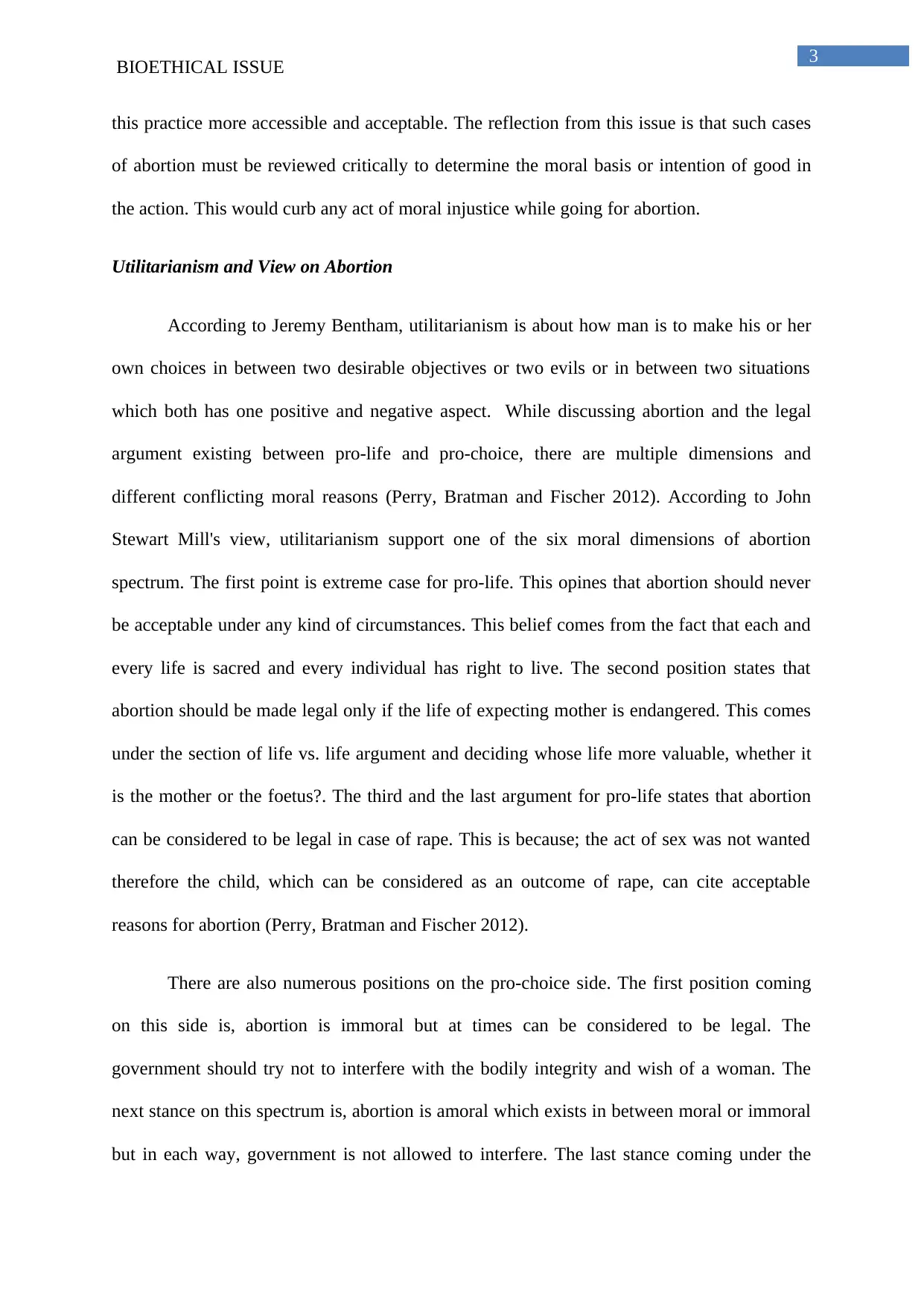
3
BIOETHICAL ISSUE
this practice more accessible and acceptable. The reflection from this issue is that such cases
of abortion must be reviewed critically to determine the moral basis or intention of good in
the action. This would curb any act of moral injustice while going for abortion.
Utilitarianism and View on Abortion
According to Jeremy Bentham, utilitarianism is about how man is to make his or her
own choices in between two desirable objectives or two evils or in between two situations
which both has one positive and negative aspect. While discussing abortion and the legal
argument existing between pro-life and pro-choice, there are multiple dimensions and
different conflicting moral reasons (Perry, Bratman and Fischer 2012). According to John
Stewart Mill's view, utilitarianism support one of the six moral dimensions of abortion
spectrum. The first point is extreme case for pro-life. This opines that abortion should never
be acceptable under any kind of circumstances. This belief comes from the fact that each and
every life is sacred and every individual has right to live. The second position states that
abortion should be made legal only if the life of expecting mother is endangered. This comes
under the section of life vs. life argument and deciding whose life more valuable, whether it
is the mother or the foetus?. The third and the last argument for pro-life states that abortion
can be considered to be legal in case of rape. This is because; the act of sex was not wanted
therefore the child, which can be considered as an outcome of rape, can cite acceptable
reasons for abortion (Perry, Bratman and Fischer 2012).
There are also numerous positions on the pro-choice side. The first position coming
on this side is, abortion is immoral but at times can be considered to be legal. The
government should try not to interfere with the bodily integrity and wish of a woman. The
next stance on this spectrum is, abortion is amoral which exists in between moral or immoral
but in each way, government is not allowed to interfere. The last stance coming under the
BIOETHICAL ISSUE
this practice more accessible and acceptable. The reflection from this issue is that such cases
of abortion must be reviewed critically to determine the moral basis or intention of good in
the action. This would curb any act of moral injustice while going for abortion.
Utilitarianism and View on Abortion
According to Jeremy Bentham, utilitarianism is about how man is to make his or her
own choices in between two desirable objectives or two evils or in between two situations
which both has one positive and negative aspect. While discussing abortion and the legal
argument existing between pro-life and pro-choice, there are multiple dimensions and
different conflicting moral reasons (Perry, Bratman and Fischer 2012). According to John
Stewart Mill's view, utilitarianism support one of the six moral dimensions of abortion
spectrum. The first point is extreme case for pro-life. This opines that abortion should never
be acceptable under any kind of circumstances. This belief comes from the fact that each and
every life is sacred and every individual has right to live. The second position states that
abortion should be made legal only if the life of expecting mother is endangered. This comes
under the section of life vs. life argument and deciding whose life more valuable, whether it
is the mother or the foetus?. The third and the last argument for pro-life states that abortion
can be considered to be legal in case of rape. This is because; the act of sex was not wanted
therefore the child, which can be considered as an outcome of rape, can cite acceptable
reasons for abortion (Perry, Bratman and Fischer 2012).
There are also numerous positions on the pro-choice side. The first position coming
on this side is, abortion is immoral but at times can be considered to be legal. The
government should try not to interfere with the bodily integrity and wish of a woman. The
next stance on this spectrum is, abortion is amoral which exists in between moral or immoral
but in each way, government is not allowed to interfere. The last stance coming under the
Paraphrase This Document
Need a fresh take? Get an instant paraphrase of this document with our AI Paraphraser
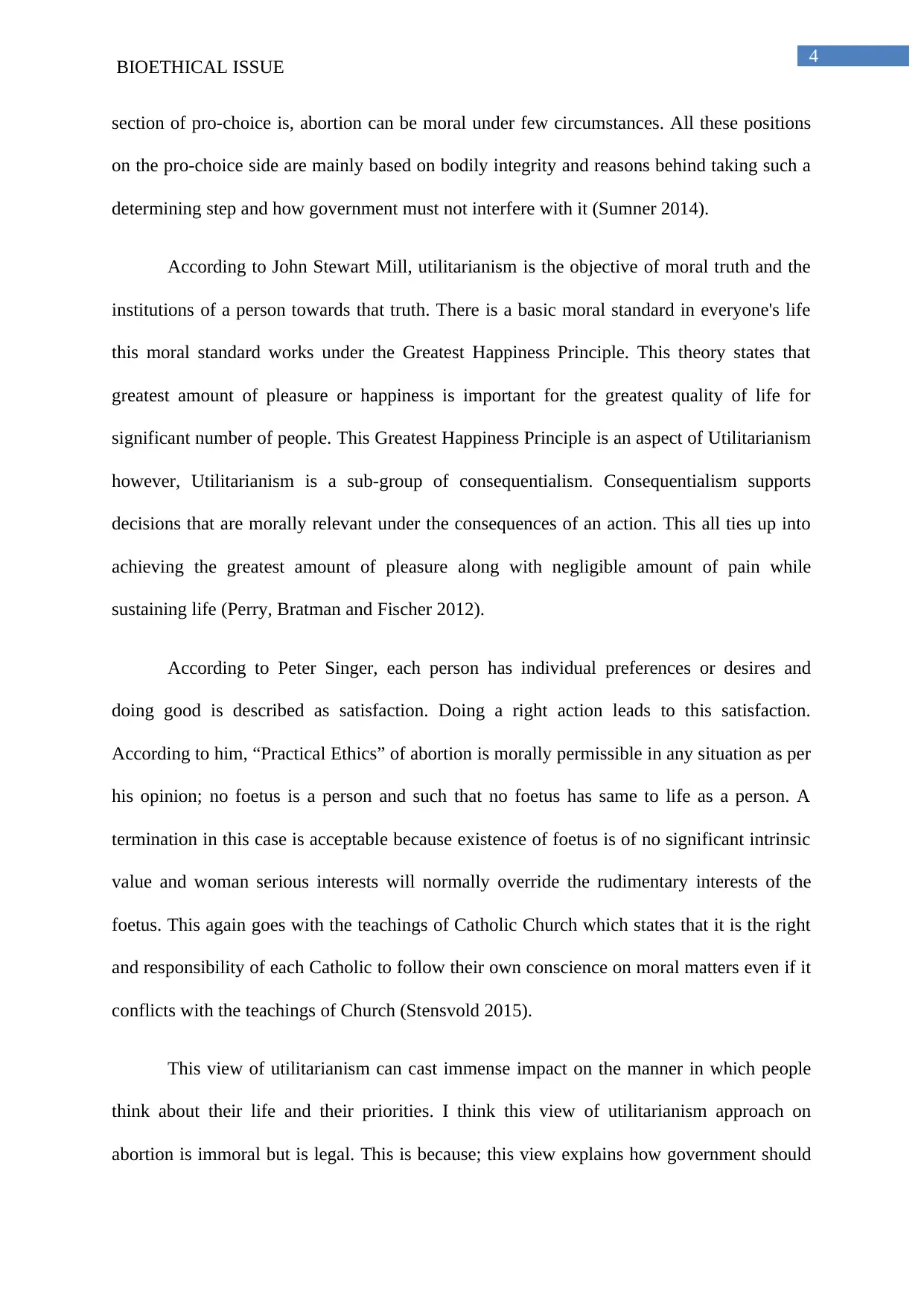
4
BIOETHICAL ISSUE
section of pro-choice is, abortion can be moral under few circumstances. All these positions
on the pro-choice side are mainly based on bodily integrity and reasons behind taking such a
determining step and how government must not interfere with it (Sumner 2014).
According to John Stewart Mill, utilitarianism is the objective of moral truth and the
institutions of a person towards that truth. There is a basic moral standard in everyone's life
this moral standard works under the Greatest Happiness Principle. This theory states that
greatest amount of pleasure or happiness is important for the greatest quality of life for
significant number of people. This Greatest Happiness Principle is an aspect of Utilitarianism
however, Utilitarianism is a sub-group of consequentialism. Consequentialism supports
decisions that are morally relevant under the consequences of an action. This all ties up into
achieving the greatest amount of pleasure along with negligible amount of pain while
sustaining life (Perry, Bratman and Fischer 2012).
According to Peter Singer, each person has individual preferences or desires and
doing good is described as satisfaction. Doing a right action leads to this satisfaction.
According to him, “Practical Ethics” of abortion is morally permissible in any situation as per
his opinion; no foetus is a person and such that no foetus has same to life as a person. A
termination in this case is acceptable because existence of foetus is of no significant intrinsic
value and woman serious interests will normally override the rudimentary interests of the
foetus. This again goes with the teachings of Catholic Church which states that it is the right
and responsibility of each Catholic to follow their own conscience on moral matters even if it
conflicts with the teachings of Church (Stensvold 2015).
This view of utilitarianism can cast immense impact on the manner in which people
think about their life and their priorities. I think this view of utilitarianism approach on
abortion is immoral but is legal. This is because; this view explains how government should
BIOETHICAL ISSUE
section of pro-choice is, abortion can be moral under few circumstances. All these positions
on the pro-choice side are mainly based on bodily integrity and reasons behind taking such a
determining step and how government must not interfere with it (Sumner 2014).
According to John Stewart Mill, utilitarianism is the objective of moral truth and the
institutions of a person towards that truth. There is a basic moral standard in everyone's life
this moral standard works under the Greatest Happiness Principle. This theory states that
greatest amount of pleasure or happiness is important for the greatest quality of life for
significant number of people. This Greatest Happiness Principle is an aspect of Utilitarianism
however, Utilitarianism is a sub-group of consequentialism. Consequentialism supports
decisions that are morally relevant under the consequences of an action. This all ties up into
achieving the greatest amount of pleasure along with negligible amount of pain while
sustaining life (Perry, Bratman and Fischer 2012).
According to Peter Singer, each person has individual preferences or desires and
doing good is described as satisfaction. Doing a right action leads to this satisfaction.
According to him, “Practical Ethics” of abortion is morally permissible in any situation as per
his opinion; no foetus is a person and such that no foetus has same to life as a person. A
termination in this case is acceptable because existence of foetus is of no significant intrinsic
value and woman serious interests will normally override the rudimentary interests of the
foetus. This again goes with the teachings of Catholic Church which states that it is the right
and responsibility of each Catholic to follow their own conscience on moral matters even if it
conflicts with the teachings of Church (Stensvold 2015).
This view of utilitarianism can cast immense impact on the manner in which people
think about their life and their priorities. I think this view of utilitarianism approach on
abortion is immoral but is legal. This is because; this view explains how government should

5
BIOETHICAL ISSUE
not interfere on bodily integrity of a woman. It is choice of the woman about what she wants
in her life and what she want to do about her body.
BIOETHICAL ISSUE
not interfere on bodily integrity of a woman. It is choice of the woman about what she wants
in her life and what she want to do about her body.
⊘ This is a preview!⊘
Do you want full access?
Subscribe today to unlock all pages.

Trusted by 1+ million students worldwide
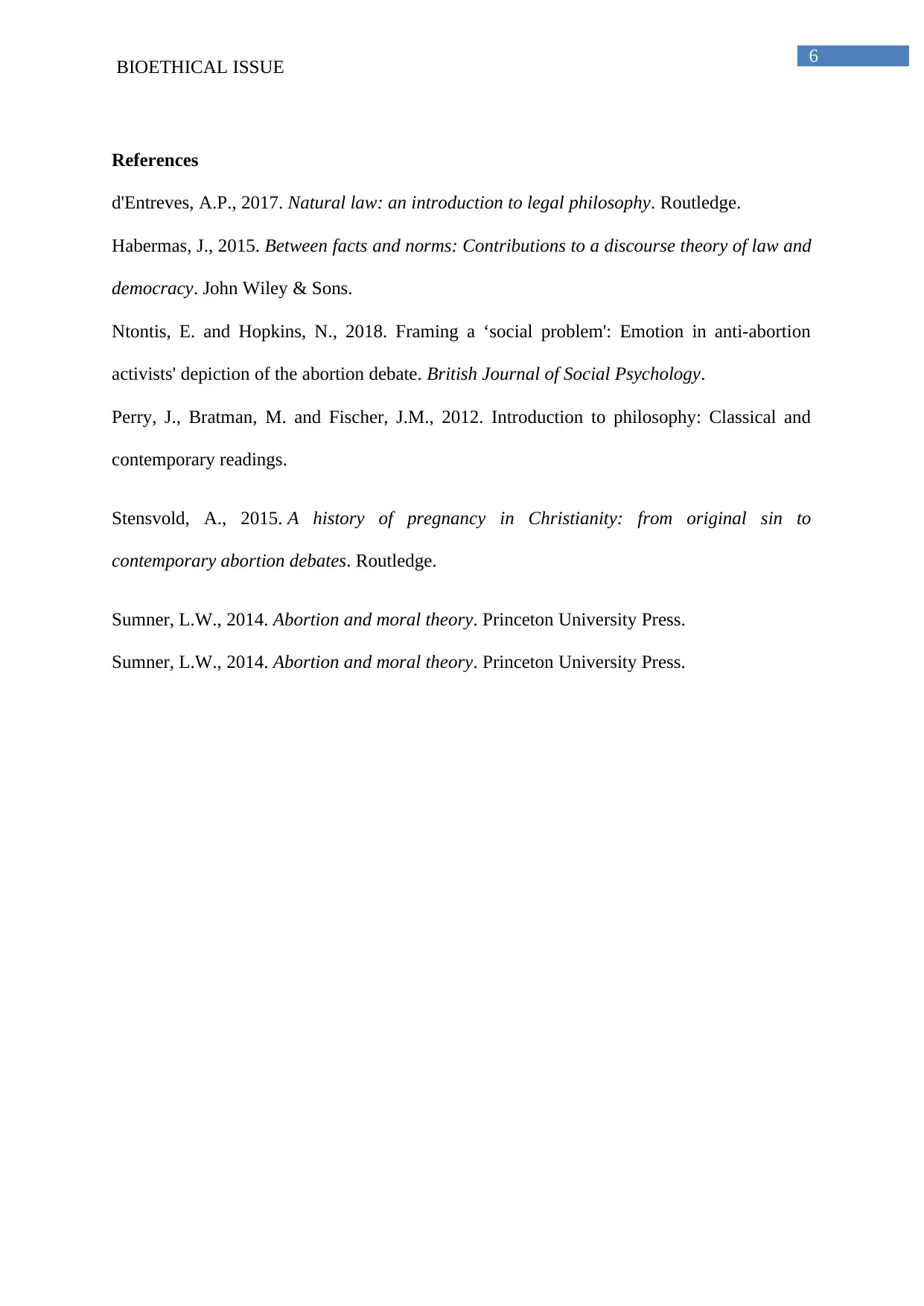
6
BIOETHICAL ISSUE
References
d'Entreves, A.P., 2017. Natural law: an introduction to legal philosophy. Routledge.
Habermas, J., 2015. Between facts and norms: Contributions to a discourse theory of law and
democracy. John Wiley & Sons.
Ntontis, E. and Hopkins, N., 2018. Framing a ‘social problem': Emotion in anti‐abortion
activists' depiction of the abortion debate. British Journal of Social Psychology.
Perry, J., Bratman, M. and Fischer, J.M., 2012. Introduction to philosophy: Classical and
contemporary readings.
Stensvold, A., 2015. A history of pregnancy in Christianity: from original sin to
contemporary abortion debates. Routledge.
Sumner, L.W., 2014. Abortion and moral theory. Princeton University Press.
Sumner, L.W., 2014. Abortion and moral theory. Princeton University Press.
BIOETHICAL ISSUE
References
d'Entreves, A.P., 2017. Natural law: an introduction to legal philosophy. Routledge.
Habermas, J., 2015. Between facts and norms: Contributions to a discourse theory of law and
democracy. John Wiley & Sons.
Ntontis, E. and Hopkins, N., 2018. Framing a ‘social problem': Emotion in anti‐abortion
activists' depiction of the abortion debate. British Journal of Social Psychology.
Perry, J., Bratman, M. and Fischer, J.M., 2012. Introduction to philosophy: Classical and
contemporary readings.
Stensvold, A., 2015. A history of pregnancy in Christianity: from original sin to
contemporary abortion debates. Routledge.
Sumner, L.W., 2014. Abortion and moral theory. Princeton University Press.
Sumner, L.W., 2014. Abortion and moral theory. Princeton University Press.
1 out of 7
Related Documents
Your All-in-One AI-Powered Toolkit for Academic Success.
+13062052269
info@desklib.com
Available 24*7 on WhatsApp / Email
![[object Object]](/_next/static/media/star-bottom.7253800d.svg)
Unlock your academic potential
Copyright © 2020–2026 A2Z Services. All Rights Reserved. Developed and managed by ZUCOL.





